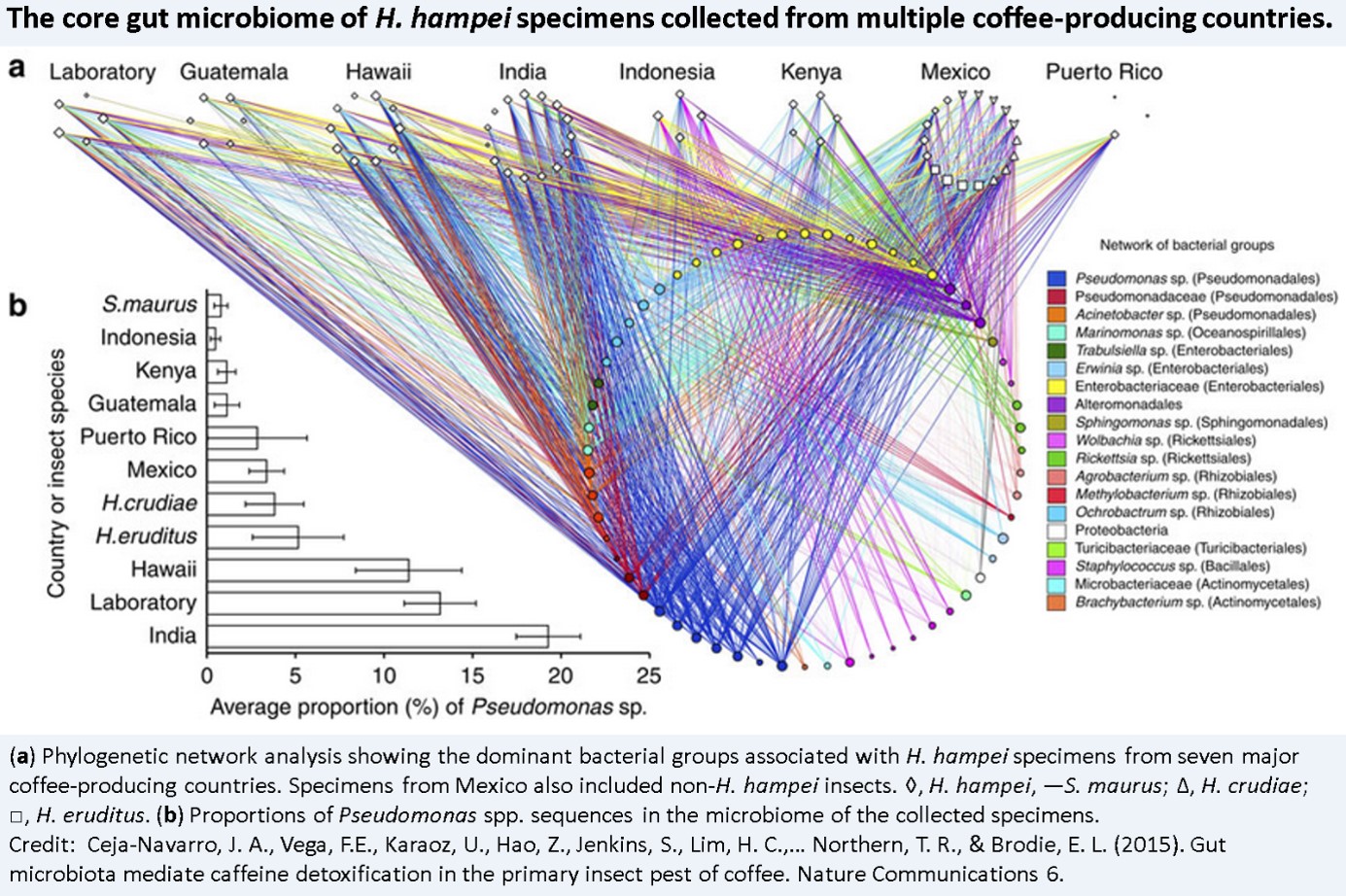Every morning, millions of people all over the world begin their morning routine with a daily dose of stimulating coffee. But did you know that a tiny beetle that’s only slightly larger than the tip of your pencil is becoming a major threat to your daily dose of go-juice? The coffee berry borer, Hypothenemus hampei, is a unique member of the beetle family, capable of ignoring the inherently toxic nature of caffeine that usually dissuades less resilient insects. And just what is the secret weapon of the coffee berry borer that allows it to munch its way through the coffee bean and deprive us of our brain juice? Only a highly specialized bacterial microbiome in its digestive system.
As Ed Yong reported recently in his infamous blog “Not Quite Rocket Science”, these beetles are responsible for upwards of $300 million in losses every year just in Brazil alone! That is a lot of Starbuck grande.
Elsewhere in the news, you might have noticed the increased attention being drawn toward our microscopic, secret overlor–I mean, symbiotic, bacterial biome. Our microbiome sustains us and nourishes us and can also occasionally kill us if the colony balance tips too far to one side. As we’re continuing to discover, bacteria colonize every portion of every portion of life on our planet. They’re responsible for everything from setting our circadian rhythms to possibly being the real culprit responsible for our BMI.
Enter Javier A. Ceja-Navarro, from the Lawrence Berkeley National Laboratory, who thought that maybe the bacteria inside the coffee berry borer was really to blame for its digestive abilities and our troubles. Ceja-Navarro collected and raised H. hampei from seven different locations around the world as well as a laboratory raised control. The first proof that the bacteria were at work was that Ceja-Navarro was unable to detect any caffeine in the feces of H. hampei raised on coffee beans, as opposed to other varieties of related bark beetles which are incapable of subsisting on coffee beans. Ceja-Navarro and crew then sequenced and identified 12 different species of bacteria from the digestive system of H. hampei, although the exact ratios and species differed from location to location.

The dominant bacteria found in all H. hampei from every location was Pseudomonadales fulva. Incidentally, P fulva houses the ndmA gene, which codes for the alpha subunit of caffeine demethylase, and was obviously the culprit that allows H. hampei to cut in on our daily java line. But to prove it, Ceja-Navarro treated the beetles with a mix of antibiotics such as tetracycline, rifampicin and streptomycin to completely wipe out the gut microbiome and showed that the beetles failed to process the caffeine or breed effectively and even the larvae that did hatch failed to make it adulthood. He then replaced P. fulva back into the beetle’s system and showed that they were once again able to survive, although without the full lineup of other bacteria, the H. hampei were still unable to molt or breed successfully.
I am utterly fascinated by the continued advancement in knowledge of the microbiota on our planet! This research is not a blanket excuse to start carpet spraying antibiotics all over our coffee bean fields. We are already losing the antibiotic resistance war and there is absolutely no justification to continue throwing more at that failure of a front. But with each “small” advancement and observation by scientists such as Ceja-Navarro, we become more aware of the microscopic world around us, what it does, how it does it and how we can utilize that knowledge for our benefit instead of just destroying it with an antibiotic nuclear strike. And maybe, in the not too distant future–just maybe, we can all just sit back and finally enjoy that steaming, hot cup of joe.
Ceja-Navarro, J. A., Vega, F.E., Karaoz, U., Hao, Z., Jenkins, S., Lim, H. C., … Northern, T. R., & Brodie, E. L. (2015). Gut microbiota mediate caffeine detoxification in the primary insect pest of coffee. Nature Communications 6.
Category Code: 79101 88241



